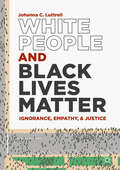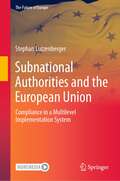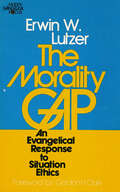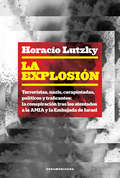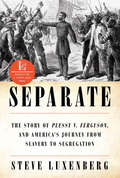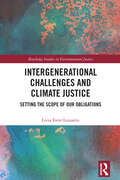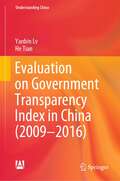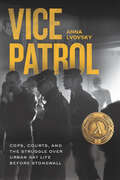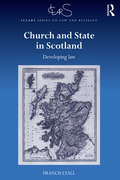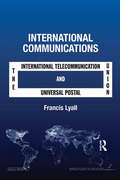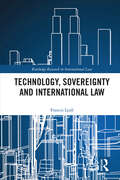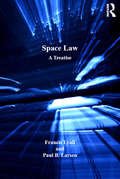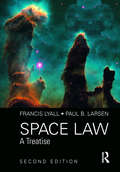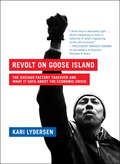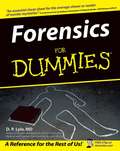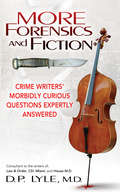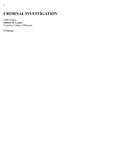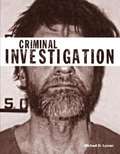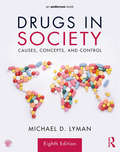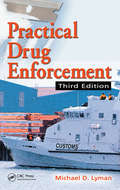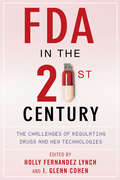- Table View
- List View
White People and Black Lives Matter: Ignorance, Empathy, and Justice
by Johanna C. LuttrellThis book interrogates white responses to black-led movements for racial justice. It is a philosophical self-reflection on the ways in which ‘white’ reactions to Black Lives Matter stand in the way of the movement’s important work. It probes reactions which often prevent white people from according to black activists the full range of human emotion and expression, including joy, anger, mourning, and political action. Johanna C. Luttrell encourages different conceptions of empathy and impartiality specific to social movements for racial justice, and addresses objections to identity politics.
Subnational Authorities and the European Union: Compliance in a Multilevel Implementation System (The Future of Europe)
by Stephan LutzenbergerThe European Union, as a regulatory polity based on integration through law, arguably relies more on legal compliance with its policies than any other political system. Proceeding from this point of departure, this book puts the spotlight on the subnational tier and scrutinizes its role in ensuring compliance. Drawing on a dataset of infringement proceedings against federal and regionalized member states, the book shows that strong shared rule, i.e., strong cooperation between national and subnational authorities, can improve national compliance records. In contrast, policy sectors with strong redistributive consequences impair subnational authorities’ capacity to comply. In short, policy and politics matter more than polity.
The Morality Gap: An Evangelical Response to Situation Ethics
by Erwin W. LutzerWith the conviction that "the gap between traditional morality and the avant-garde approach is widening," Erwin W. Lutzer offers this precise, easy-to-understand, and knowledgeable critique of situation ethics.This presentation adds new insights to the discussion of morality and the ethic of love. Lutzer pinpoints the fallacies of the situationalist's philosophy and offers a biblical alternative that clearly recognizes and deals with moral conflicts.
The Morality Gap: An Evangelical Response to Situation Ethics
by Erwin W. LutzerWith the conviction that "the gap between traditional morality and the avant-garde approach is widening," Erwin W. Lutzer offers this precise, easy-to-understand, and knowledgeable critique of situation ethics.This presentation adds new insights to the discussion of morality and the ethic of love. Lutzer pinpoints the fallacies of the situationalist's philosophy and offers a biblical alternative that clearly recognizes and deals with moral conflicts.
La explosión: la conspiración tras los atentados a la AMIA y la Embajada de Israel
by Horacio LutzkyEl encubrimiento de los servicios de inteligencia de varios gobiernos, los más altos funcionarios del poder político argentino de los años 90, agentes de la SIDE y de la Policía Federal de los atentados a la Embajada de Israel y la AMIA. Aburrida en una guardia inmobiliaria, una mujer encuentra en un placard un impreso con información comprometedora sobre el atentado a la AMIA ocurrido en Buenos Aires en 1994. El título la estremece: Expediente bomba: el Irán-Baires-Bosnia-gate. Bajo el formato de una ficción, Horacio Lutzky, coautor del exitoso Iosi. El espía arrepentido, narra la trama secreta que terminó en la voladura de la mutual judía y las razones del encubrimiento del atentado. La explosión es el relato de una investigación escalofriante que, en el contexto de la guerra de los Balcanes, revela los hilos del contrabando de armas y explosivos en el que participaron traficantes y terroristas sirios, agentes iraníes, criminales de guerra nazis, importantes autoridades políticas y comunitarias argentinas, militares e integrantes de las fuerzas de seguridad, y algunos jueces, con el visto bueno de políticos y dirigentes israelíes y estadounidenses.
Buying Your Home: A Practical Guide for First-Time Buyers
by Lien Bich Luu Ai-Quang TonthatMany young people aspire to own their own home but face a myriad of challenges such as high property prices, the need to raise a large deposit, and difficulties of getting a mortgage. The process of buying a property is also stressful, fraught with complexity and uncertainty, and a mistake can prove very costly. This book therefore provides a much-needed step-by-step guide to help those seeking to buy a property for the first time. Packed with helpful and practical tips, this book gives a complete overview of the house-buying process, including finance, legal and property aspects. The authors discuss a wide range of topics, including: creating the right mindset the pros and cons of home ownership how to choose a suitable property how to save for a deposit how to negotiate for a better price how to get a mortgage the steps in the house-buying process how to ensure that mortgage payments can always be met The book is written by experienced property buyers who have bought multiple properties, who have worked as a mortgage adviser and financial planner and who understand personal finance. It will be essential reading for undergraduate students in the field of accounting and finance and will also appeal to the general public, particularly those seeking to buy a property for the first time. After reading the book, readers will be able to map out a plan to buy their first property with greater confidence and make a better and more informed decision that will bring financial rewards.
Separate: The Story of Plessy v. Ferguson, and America's Journey from Slavery to Segregation
by Steve LuxenbergA myth-shattering narrative of how a nation embraced "separation" and its pernicious consequences. <P><P> Plessy v. Ferguson, the Supreme Court case synonymous with “separate but equal,” created remarkably little stir when the justices announced their near-unanimous decision on May 18, 1896. Yet it is one of the most compelling and dramatic stories of the nineteenth century, whose outcome embraced and protected segregation, and whose reverberations are still felt into the twenty-first. <P><P> Separate spans a striking range of characters and landscapes, bound together by the defining issue of their time and ours—race and equality. Wending its way through a half-century of American history, the narrative begins at the dawn of the railroad age, in the North, home to the nation’s first separate railroad car, then moves briskly through slavery and the Civil War to Reconstruction and its aftermath, as separation took root in nearly every aspect of American life. <P><P>Award-winning author Steve Luxenberg draws from letters, diaries, and archival collections to tell the story of Plessy v. Ferguson through the eyes of the people caught up in the case. Separate depicts indelible figures such as the resisters from the mixed-race community of French New Orleans, led by Louis Martinet, a lawyer and crusading newspaper editor; Homer Plessy’s lawyer, Albion Tourgée, a best-selling author and the country’s best-known white advocate for civil rights; Justice Henry Billings Brown, from antislavery New England, whose majority ruling endorsed separation; and Justice John Harlan, the Southerner from a slaveholding family whose singular dissent cemented his reputation as a steadfast voice for justice. <P><P>Sweeping, swiftly paced, and richly detailed, Separate provides a fresh and urgently-needed exploration of our nation’s most devastating divide.
Intergenerational Challenges and Climate Justice: Setting the Scope of Our Obligations (Routledge Studies in Environmental Justice)
by Livia Ester LuzzattoClimate change poses questions of intergenerational justice, but some of its features make it difficult to determine whether we have obligations of climate justice to future generations. This book offers a novel argument, justifying the present generation’s obligations to future people. Livia Luzzatto shows that we have intergenerational obligations because many of our actions are based on presuppositions about future people. When agents engage in such intergenerational actions, they acquire an obligation to also recognize those future people as agents within their principles of justice, and with that a duty to respect their agency and autonomy. Intergenerational Challenges and Climate Justice also offers a way to circumvent the problems of non-identity and non-existence. Its approach overcomes the intergenerational challenges of climate change by meeting three necessary criteria: providing ways to cope with uncertainty, dealing with the complexity of climate change, and including future people for their own sake. The author meets these criteria by adopting an action-centered methodology that grounds our obligations of justice on the presuppositions of activity. This robust framework can be used to justify increased climate action and the greater inclusion of future-oriented policies in current decision making. This book will be of great interest to academics and students concerned with the issues of climate and intergenerational justice.
Evaluation on Government Transparency Index in China (Understanding China)
by Yanbin Lv He TianThis book presents the outcomes of a study on indices of rule by law in China conducted by the Chinese Academy of Social Sciences (CASS). Since 2009, a group of researchers at the CASS Institute of Law has worked to assess the Chinese government’s transparency. In this context, they designed an index system to truthfully record and reflect the reality and development of openness in the Chinese government for eight consecutive years. This book compiles their reports on each year’s development, systematically combining quantitative analysis and the status quo for each year. Thanks to these reports, readers will be able to clearly understand the evolution of the Chinese government’s openness during these eight years. They highlight what the government has done to improve transparency, what has been achieved, and the goals for the future. These reports have not only been acclaimed in academic circles, but have also greatly influenced government policies and procedures. For example, the assessment was expanded to the judicial system including the Supreme People’s Court, maritime court, and local provincial courts in 2011, and ever since the national judicial system’s openness has been considerably improved, in response to recommendations based on the assessment.
Vice Patrol: Cops, Courts, and the Struggle over Urban Gay Life before Stonewall
by Anna LvovskyIn the mid-twentieth century, gay life flourished in American cities even as the state repression of queer communities reached its peak. Liquor investigators infiltrated and shut down gay-friendly bars. Plainclothes decoys enticed men in parks and clubs. Vice officers surveilled public bathrooms through peepholes and two-way mirrors. In Vice Patrol, Anna Lvovsky chronicles this painful story, tracing the tactics used to criminalize, profile, and suppress gay life from the 1930s through the 1960s, and the surprising controversies those tactics often inspired in court. Lvovsky shows that the vice squads’ campaigns stood at the center of live debates about not only the law’s treatment of queer people, but also the limits of ethical policing, the authority of experts, and the nature of sexual difference itself—debates that had often unexpected effects on the gay community’s rights and freedoms. Examining those battles, Vice Patrol enriches understandings of the regulation of queer life in the twentieth century and disputes about police power that continue today.
Church and State in Scotland: Developing law (ICLARS Series on Law and Religion)
by Francis LyallThe interaction of faith and the community is a fundamental of modern society. The first country to adopt Presbyterianism in its national church, Scotland adopted a system of church government, which is now in world-wide use. This book examines the development and current state of Scots law. Drawing on previous material as well as discussing current topical issues, this book makes some comparisons between Scotland and other legal and religious jurisdictions. The study first considers the Church of Scotland, its ’Disruption’ and statutorily recognised reconstitution and then the position of other denominations before assessing the interaction of religion and law and the impact of Human Rights and various discrimination laws within this distinctive Presbyterian country. This unique book will be of interest to both students and lecturers in constitutional and civil law, as well as historians and ecclesiastics.
International Communications: The International Telecommunication Union and the Universal Postal Union
by Francis LyallThe International Telecommunication Union (ITU) and the Universal Postal Union (UPU) are the two major international organisations that are involved in the regulation of international communications. The ITU deals with electronic communications including radio. The UPU deals with mail. As such, both organisations are of major importance in modern life. This volume provides an up-to-date analysis of their development from inception to the present as they have responded to technical and political change. It also makes suggestions for the future. The volume will be an invaluable resource for researchers and students, policy-makers, government officials and administrators, and legal staff in telecommunication and postal organisations.
Technology, Sovereignty and International Law (Routledge Research in International Law)
by Francis LyallThe dogma of the sovereignty of the state, deriving from the Peace of Westphalia, underpins much of the modern-day international system. However, developments in recent technology have led this ideology to depart from reality. Viewing state sovereignty through the prism of public international law, the book will begin with an overview of the settlement of Westphalia, how it has influenced international documents ever since, and how the advantages of centralised decisions came to be perceived. By surveying the Law of the Sea, Maritime Law, Air and Aviation, Telecommunications, Postal Services, Space Law and Mensuration, the book demonstrates how, in each, the interplay between state sovereignty and developing technologies have caused significant legal change. Some changes, Lyall argues, such as international measures of time and geography, have been born out of convenience, facilitated by technology developed for the purpose. Other areas of change developed out of a desire to reconcile conflicts or harmonise necessary state regulation. The book analyses the reasons behind these changes, and discusses the ongoing attempts to balance state equality, measures adopted by new institutions to secure comprehensive representation, and ends by looking to the future of state sovereignty in an increasingly globalised world. The book is of use to any student or scholar interested in policy making, international law and international affairs, both legal and scientific, as well as those looking at legal administrative issues and government officiation.
Space Law: A Treatise (Library Of Essays In International Law Ser.)
by Francis Lyall Paul B. LarsenThe opening of space to exploration and use has had profound effects on society. Remote sensing by satellite has improved meteorology, land use and the monitoring of the environment. Satellite television immediately informs us visually of events in formerly remote locations, as well as providing many entertainment channels. World telecommunication facilities have been revolutionised. Global positioning has improved transport. This book examines the varied elements of public law that lie behind and regulate the use of space. It also makes suggestions for the development and improvement of the law, particularly as private enterprise plays an increasing role in space.
Space Law: A Treatise 2nd Edition (Library Of Essays In International Law Ser.)
by Francis Lyall Paul B. LarsenFrancis Lyall and Paul B. Larsen have been involved in teaching and researching space law for over 50 years. This new edition of their well-received text gathers together their knowledge and experience in readable form, and covers developments in all space applications, including space tourism, telecommunications, the ITU and finance. With an extensive citation of the literature, the discussion provides an excellent source for both students and practitioners.
Revolt on Goose Island
by Kari LydersenRevised and updated, with a new afterword by the author"There is much talk about 'audacity' these days, but true chutzpah is when the workers take over the factory and take on the bank. Kari Lydersen's invaluable account of the Republic sit-down strike is an instruction manual for worker dignity."--Mike Davis, author of Buda's Wagon and City of QuartzDecember 5, 2008: It wasn't supposed to work like this. Days after getting a $45 billion bailout from the U.S. government, Bank of America shut down a line of credit that kept Chicago's Republic Windows & Doors factory operating. The bosses, who knew what was coming, had been sneaking machinery out in the middle of the night. They closed the factory and sent the workers home.Then something surprising happened: Republic's workers occupied the factory and refused to leave.Kari Lydersen, an award-winning reporter, tells the story of the factory takeover, elegantly transforming the workers' story into a parable of labor activism for the twenty-first century, one that concludes with a surprising and little-reported victory.From the Trade Paperback edition.
Forensics for Dummies
by D. P. LyleForensics for Dummies is an introduction to the field of forensic science, covering a broad range of forensic topics in a clear and concise fashion. It includes many examples of how these techniques are applied in real-life situations. Case studies are included throughout the book to illustrate how forensic science was used to solve famous cases. This book is an excellent starting point for fresher and for those familiar with many forensic topics, it serves to refresh and expand the knowledge.
More Forensics and Fiction
by D P LyleThis compilation of medical and forensic science questions from crime writers around the world provides insight into medical and forensic science as well as a glimpse into the writer's creative mind. How do hallucinogenic drugs affect a blind person? Will snake venom injected into fruit cause death? How would you perform CPR in a helicopter? What happens when someone swallows razor blades? How long does it take blood to dry? Can DNA be obtained from a half-eaten bagel? D. P. Lyle, MD, answers these and many more intriguing questions. The book is a useful and entertaining resource for writers and screenwriters, helping them find the information they need to frame a situation and write a convincing description. TV viewers, readers who enjoy crime fiction, and those who want to know more about forensic science can keep up with the news and understand the science behind criminal investigation. From traumatic injuries to the coroner's office, the questions and answers are divided into five parts, making it a compendium of the incredible information that lies within the world of medicine and forensics.
Criminal Investigation: The Art And The Science
by Michael LymanCriminal Investigation: The Art and the Science ― by nationally recognized criminal investigation expert Michael Lyman ― is a clear, thorough examination of the fundamentals of criminal investigation and forensic science, as currently practiced throughout the US. It explores past experiences of investigators alongside forensic and technological innovations. Paralleling the steps of the criminal investigation, the 9th edition has been extensively updated with new and revised material, a new chapter on investigating officer-involved shootings, and updated case studies and graphics.
Criminal Investigation
by Michael D. LymanCriminal Investigation: A Brief Introduction is written in an innovative "brief" format, making it more easily understood by students and more user-friendly for instructors. It presents crime detection as a field that relies heavily on past experiences of investigators as well as recent practical, forensic, and technological innovations. This new text blends scientific theories of crime detection with a practical approach to criminal investigation and follows the belief that sound criminal investigations depend understanding the science of crime detection procedures and the art of anticipating human behavior.
Drugs in Society: Causes, Concepts, and Control
by Michael D. LymanDrugs in Society: Causes, Concepts, and Control, Eighth Edition, focuses on the many critical areas of America's drug problem, providing a foundation for rational decision-making within this complex and multidisciplinary field. Lyman offers a comprehensive big-picture examination of the US drug problem, dealing with drugs, abusers, drug enforcement, and public policy. Organized in three sections: Understanding the Problem, Gangs and Drugs, and Fighting Back, topics covered include the business of drugs and the role of organized crime in the drug trade, drug legalization and decriminalization, legal and law enforcement strategies, an analysis of the socialization process of drug use and abuse, and a historical discussion of drug abuse that puts the contemporary drug problem into perspective. Suitable for upper-level undergraduates in Criminal Justice, Criminology, and related programs, Drugs in Society, Eighth Edition, uses logical organization and strong pedagogy (case studies, focused text boxes with related information, critical thinking tasks) to support learning objectives.
Practical Drug Enforcement (ISSN)
by Michael D. LymanCriminal investigation is a dynamic endeavor impacted by changes in human nature, statutory and constitutional laws, and methods of operation. New challenges are constantly posed for the investigator and the investigation of drug offenses is no exception. It takes advanced skills to keep pace with the criminal mind. Unfortunately, the skills acquir
Great Australian Dissents
by Andrew LynchWhen judges disagree, those in the minority write a dissenting opinion. This book considers the great dissents in Australian law. Their worth may derive from numerous factors, including their rhetorical force as a piece of legal reasoning or emotive power as a judicial lament for the 'error' into which the majority has fallen; the general importance of the issue at stake; as a challenge to the orthodoxy; and, sometimes, the subsequent recognition of a dissenting opinion's correctness and its ultimate vindication. On some occasions, all these features may be strongly present, on others only some. Through a diverse selection of memorable dissenting opinions, this book illuminates the topic of judicial disagreement more generally - not only through examples of instances when minority opinions have been distinctly valuable, but by drawing out a richer understanding of the attributes and circumstances which lead some dissents to become iconic, while so many lie forgotten.
Inside The Criminal Courts
by David R. LynchInside the Criminal Courts is an innovative textbook that combines elements of nonfiction with fictional stories based in large part on author David Lynch's experiences as a full-time prosecutor and full-time public defender. Lynch, who holds both a law degree and a PhD in criminal justice, has published numerous articles on the criminal courts in such leading journals as Law & Social Inquiry, Criminal Justice and Behavior, and the Journal of Criminal Justice. He currently teaches in the criminal justice program at Weber State University where he recently won a prestigious teaching award.
FDA in the Twenty-First Century: The Challenges of Regulating Drugs and New Technologies
by Lynch Holly Fernandez Cohen I. GlennIn its decades-long effort to assure the safety, efficacy, and security of medicines and other products, the Food and Drug Administration has struggled with issues of funding, proper associations with industry, and the balance between consumer choice and consumer protection. Today, these challenges are compounded by the pressures of globalization, the introduction of novel technologies, and fast-evolving threats to public health. With essays by leading scholars and government and private-industry experts, FDA in the Twenty-First Century addresses perennial and new problems and the improvements the agency can make to better serve the public good.The collection features essays on effective regulation in an era of globalization, consumer empowerment, and comparative effectiveness, as well as questions of data transparency, conflicts of interest, industry responsibility, and innovation policy, all with an emphasis on pharmaceuticals. The book also intervenes in the debate over off-label drug marketing and the proper role of the FDA before and after a drug goes on the market. Dealing honestly and thoroughly with the FDA's successes and failures, these essays rethink the structure, function, and future of the agency and the effect policy innovations may have on regulatory institutions abroad.
